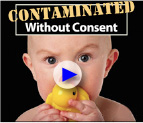Phthalates (pronounced “THAL-ates”) are hormone-disrupting chemicals (also known as endocrine disruptors) commonly used in consumer and are used in soft vinyl plastics, such as backpacks, lunch boxes, office supplies, shower curtains, and flooring. They are also in cosmetics, shampoos, lotions, and other personal care products, hidden behind the word “fragrance”. Phthalates disrupt testosterone and thyroid hormones and have been linked to serious health issues, including learning and behavior challenges, birth defects, asthma, and cancer.
A 2015 report from the Campaign for Healthier Solutions is called A Day Late And A Dollar Short: Discount Retailers are Falling Behind on Safer Chemicals shares testing results for 164 products purchased in “dollar stores”, including toys, jewelry, school supplies and other household items. Over 81% (133 of 164) of products tested contained at least one hazardous chemical above levels of concern, including toxic phthalates. Of the products tested for phthalates (tub mats, bathtub appliqués, vinyl floor runners, pencil pouches, and steering wheel covers, etc.) 12 out of 38 contained levels of phthalates above the Consumer Product Safety Commission (CPSC) limit for children’s products.
Resources
European Union Restrictions on 4 phthalates
European Chemical Agency’s Member State Committee (MSC) has unanimously agreed to identify the phthalate DEHP as a substance of very high concern because of its endocrine-disrupting properties in the environment.
Phthalates in the News
The end is near for phthalate plasticizers
Maine’s 2015 citizen initiated rule on phthalates disclosure
Maine body burden study for phthalates and other chemicals Hormones Disrupted
Phthalates are everywhere article and “What’s in your shampoo” interactive tool




